Maple Leafs Hot Stove caught up with Marc Crawford ahead of the NHL Draft to discuss what the Toronto Maple Leafs are getting in presumptive first overall pick Auston Matthews.
You obviously coached Auston Matthews this year and you’ve done a lot of media, so a lot of this has been covered. I just wanted to get more of a background on his personality. How do you think his personality is going to work in Toronto? Obviously there is quite a bit of Toronto media attention here, to put it mildly.
Marc Crawford: I think it will work really well. He’s a genuinely humble kid. When you have that kind of talent and that kind of humility, I think it’s more of a rarity than the norm. You have to be very ambitious to be good. Auston is ambitious. I think you need to have a certain amount of ego in order to have the drive to get to that level as well. But he does have that and he’s still very grounded. For that, I give a lot of credit to his parents. His parents really have done a good job of keeping him grounded and respectful. He just carries himself the right way. He’s genuinely like that. He’s embarrassed by the attention.
To tell a story, in Zurich, it wasn’t that big of a problem with people recognizing him and what not. We sent one of our young players with him for one of our first games at a small venue. He went with this guy, Roger Karrer, and they were going through the streetcar system. He got mobbed on the streetcars. Roger Karrer was freaking out. He was going, “I couldn’t believe it. People were coming up to him!” You talk to Auston and Auston’s just like, “aww, shucks.” He brushed it off. I don’t think he’ll be riding streetcars in Toronto.
He seems to strike that balance where he doesn’t lack self-confidence. I know that he’s confident in himself as an athlete, but he doesn’t have the arrogance a lot of the top athletes have or seem to have, anyway.
Crawford: He’s respectful, I think would be the right way to put it. He knows he’s good. Make no mistake about that. Again, I think the balance is that he doesn’t take anything for granted. Again, I give his parents a lot of credit. Being respectful of people who aren’t quite as talented as you, who don’t have the god-given abilities that he has, I think that’s the right way to be. I think he’s proven all along that he finds the level that you need to find to be the type of player that he wants to be. He’s a very driven young man.
I always found that you learn more in practice about a player than you do in a game. What’s he like in practice?
Crawford: He’s good. He’s a kid that wants to be first in every drill. I like that about him. He’s very competitive. I think he has that similarity to a lot of great players I’ve had before. Whether you’re doing a drill that’s a race, or we did a puckhandling drill that was kind of like a follow the leader sort of thing, and he was always trying to be the best at that and to try to outdo the guy that was leading before him. He’s got an amazing competitiveness and an amazing desire to be the best at everything. Again, having had great players, that’s one of the similarities with a guy like Forsberg, a guy like Kopitar, a guy like Jamie Benn. They all have that trait. Auston definitely has it.
I saw that he went straight to Florida after the end of the season to work with a skills coach with literally no time off.
Crawford: He wanted to make sure he was ready for the World Championships. We thought we’d be playing for at least a few weeks more, but we got beat out quickly. He very much tried to do whatever he could to allow himself to be seen in a good light. That’s just his professionalism and his desire to be excellent.
What do you think he needs to work on right now? Obviously, he’s 18 so he has to catch up with his body a bit. He’s a big lad. But what are the different areas that he needs to work on that you see?
Crawford: I watched in the World Championships and I was so pleased to see how well he was playing. Knowing him, you could just see his confidence grow as he said, “hey, I know this level.” I think he’s going to do the same at the NHL level. The NHL is humbling. People do get to know you really well. You always have to push yourself to find a different way to beat people. Again, I think Auston has that as part of who he is. He very much tries to work for improvement in his game on an almost-daily basis. That’s what will be necessary. I don’t see any huge areas of concern. I think every player has to deal with NHL strength and the strength of NHL defenders. That is the about the only thing that will – not surprise him – but it’s something he’ll have to adjust to. It’s okay to do it in three or four games in the World Championships, but when it’s a daily occurrence, and when you’re playing a back to back against two hard defensive-style teams, it’s where you learn to get to a different level of strength yourself so that the grind isn’t a grind and you’re able to power your way through it. His intelligence and his competitiveness are going to carry him a long way when you add that to the great skillset that he has. He’s going to be excellent. He really will. He’s going to be excellent, and I think he’s going to have a chance to be very, very special.
You won coach of the year in the AHL and went to the Calder Cup Finals with St. John’s. How would you compare – and obviously the league is a bit different now than when you coached there – the Swiss league to the AHL in terms of level of competition?
Crawford: It’s a better skill league, but it doesn’t have the physical intensity that the AHL has. In scoring, this year, there were probably five guys that played in the Swiss league that were right near the top in the American league in scoring. It isn’t as much of a developmental league. You don’t get the physical confrontation battle that you get in the American league. It’s a great place for young players to learn the game, to learn the competitiveness that is necessary to play at the NHL level. I think it’s harder to play well at the American league level than any other level, including the NHL. Everybody is competitive in that league, and only the strong survive and end up getting themselves into the NHL. I still think there’s lots of skill, lots of speed, lots of everything in that league.
Do you think he could’ve played in the NHL last year?
Crawford: Oh yeah. Absolutely no question. I think he would’ve been in the conversation with Eichel and McDavid. First day I saw him with us, and I had seen him during the U18 and had watched him play four games in the U18 the year before at the end of his season, I had no doubt that he was going to be able to play for us. But as soon as I saw him play the first day of our training camp when he came over, I was like, “Wow.” You forget how talented special players are. Not having been in the NHL for four years, you forget how good the Jamie Benns of the world are, the Brad Richards, the Lou Erikssons and Anze Kopitars, or all the special guys I had in Vancouver and Colorado. You forget just how talented the special players are. When you see one again, “oh yeah, that’s what that looks like.” It was so nice to have such a talented player again. It really was.
It’s invigorating for a coach, I’m sure.
Crawford: It really was, especially to have one that young. You know that there are things that he doesn’t know and you try to stay on top of those things. He was really receptive of it. I’m really proud of him because I saw how well he played away from the puck. I felt really happy about that. All the things that we worked on with him, he got it. That’s really going to help his transition.
By all accounts, that was one of the reasons he chose to go over there – the fact that he would get a chance to work with you and work on the defensive side of the game. He’s almost a year or two ahead of his peers in that regard, where they’re going to have to build their game up defensively and try to figure that out while putting up points.
Crawford: For sure. You always want to work on continuing to improve your offensive game. Everytime I talk to Auston, I’d always say, “hey, you’re a scorer. You want to be a scorer in the NHL.” I always remember a conversation I had with Wayne Gretzky where I told him, “you played so good you could’ve been Doug Jarvis.” He said, “yeah, but then Glen Sather would’ve wanted to pay me like Doug Jarvis.” Enough said. Again, you never want to lose sight of that. He’s an offensive player. I always worked with him on everything. You want to play great away from the puck, but you want to have the puck more. You want to play great without the puck so that you’re on the ice when the game counts. I always believed that your best players, if they’re committed, can be your best players both ways. That’s always what I strived for with Auston.
I know Guy Boucher, when he was coaching in the Q, coached Sydney Crosby in practice differently than he did other players because the drills were too easy for him and it wasn’t encouraging his development as much. Did you help Auston with that after practice, looking at some skill development? Obviously, the great players work on their stuff not stop, but was there anything you guys did there?
Crawford: We had a lot of secondary practices on Mondays and Thursdays because our schedule was always conducive to that. We don’t have a tough schedule. That was another sales thing that we had for Auston and all the other young players that came to play for us, that you get this extra development with the second practice all the time. That’s where we worked on penalty killing with Auston. We worked a great deal on powerplay and powerplay options and powerplay positioning. It was great to have him because he was at such a high level that he started to bring some of the other young guys up. He would work with the younger guys because the older guys wouldn’t be there. We had opportunities to bring up guys from our B team for quality second practices all the time. As far as skill development, we did a lot of puck protection down low. We did a lot of forcing pucks to the net and how to drive to the net and make power moves to the net. We did shooting in stride. All sorts of things that I think are useful to players. He has greatness in so many of those areas already.
You’re going to be coaching against him next year four times.
Crawford: Unless he drops to #12.
How do you coach against him, now that you have the inside scoop on him? How do you get at him?
Crawford: I’m going to let Guy worry about that.



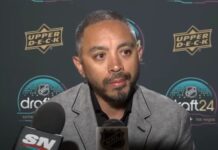








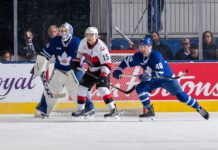




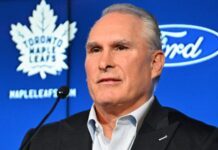
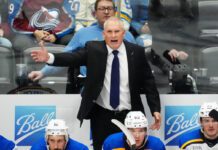


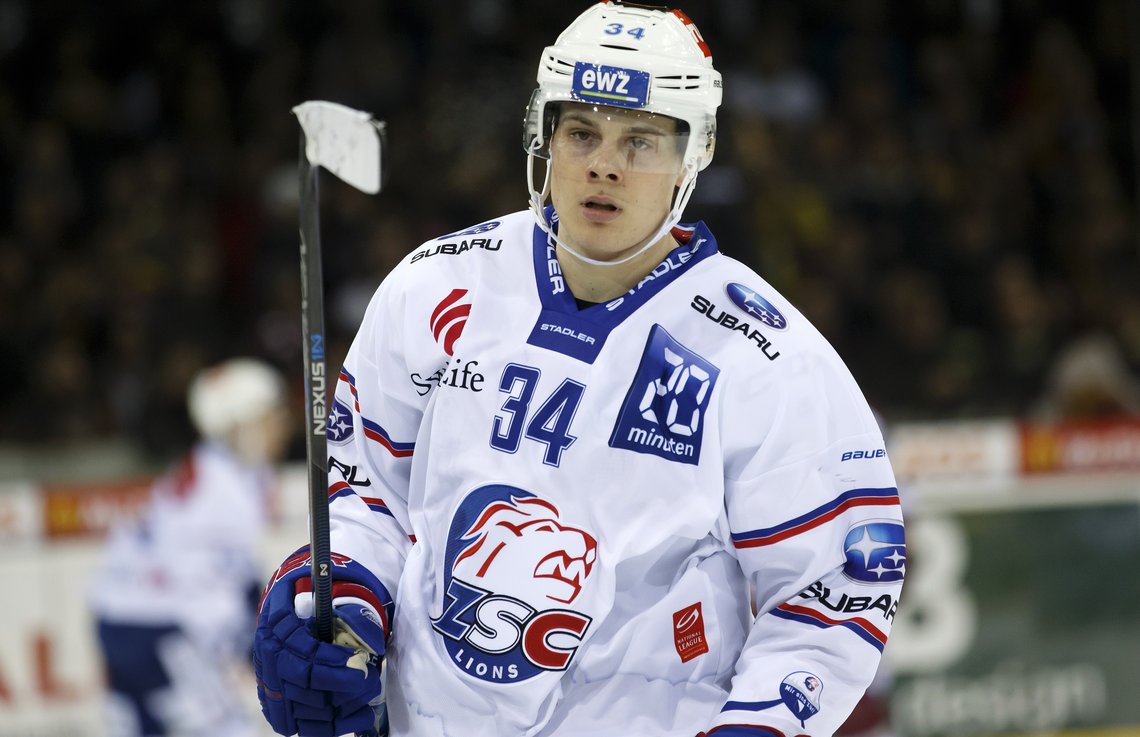
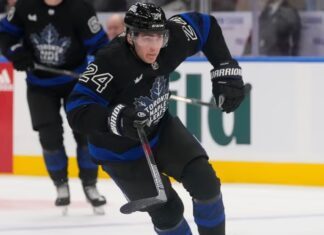







![New Leaf Anthony Stolarz on the opportunity in Toronto: “In Florida, I knew my role as a backup… Now, [Joseph Woll] and I are competing for starts… As a goalie, that’s all you can ask for” Anthony Stolarz, Stanley Cup win, now Maple Leaf](https://mapleleafshotstove.com/wp-content/uploads/2024/07/anthony-stolarz-sc-100x70.jpg)
